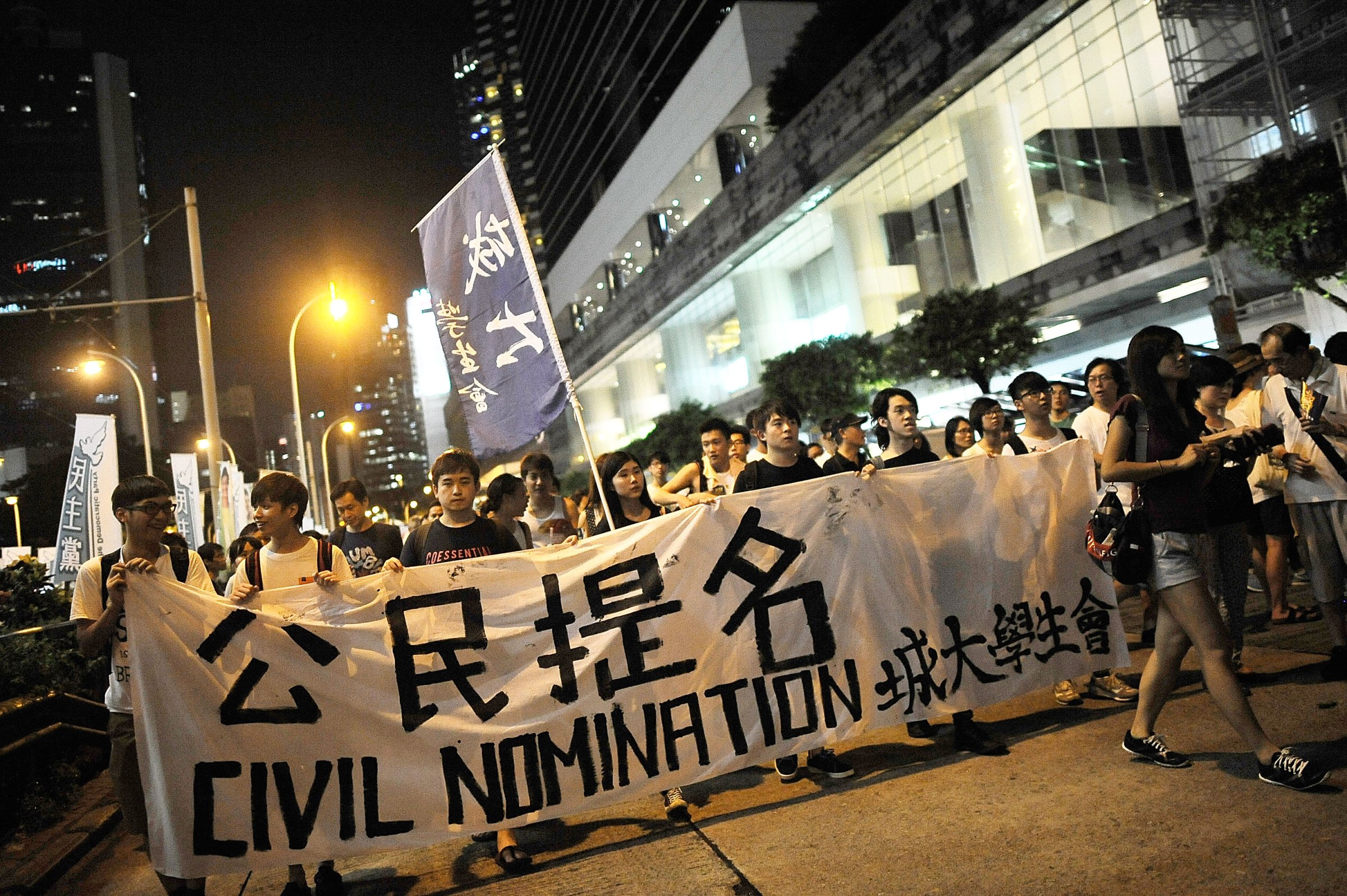
Two and a half years ago, at a polling station in Taipei, I met a man from Hong Kong. It was the final day of what had been a hard-fought race between Taiwanese President Ma Ying-jeou’s Kuomintang, which wanted closer ties with the People’s Republic of China, and the more independence-minded opposition. What did the man from Hong Kong think?
He said he was not there to protest or politick; he was interested in the process itself. He flew in on his own dime to bear witness to democracy being exercised, and to take notes. To him, Taiwan represented the possibility of full democracy in Greater China. Hong Kong would get its chance, he said, and it would be ready. It was only a matter of time.
It has now been 17 years since the Union Jack was lowered over Hong Kong and this former colony returned to Chinese sovereignty. Under a political conceit known as “one country, two systems,” the city was told that its day-to-day way of life — common law, unfettered communications and all the rest — would remain unchanged for 50 years. But on matters of state, such as security and foreign policy, Hong Kong would be beholden to Beijing.
The forced marriage of Asia’s Manhattan and a highly repressive, one-party nation has always been an awkward one. Hong Kongers did not choose it. But in Beijing’s “two systems” provision, many of them were lulled into thinking that Hong Kong and China were to enjoy a sort of parity; to them, the emphasis on the territory’s new designation as China’s “Special Administrative Region” fell very much on the first word.
Beijing has never seen it that way. To the grandees of the Chinese Communist Party, the return of Hong Kong to China in 1997 righted a historical humiliation suffered at the hands of British opium merchants, and the autonomy Beijing was prepared to grant Hong Kong was a civic autonomy only. It certainly didn’t amount to the de facto independence that many Hong Kongers still yearn for.
Beijing has made its position consistently clear — most recently in a white paper on its relationship to Hong Kong, in which it emphasized its “comprehensive jurisdiction” over the territory, and in an ill-timed editorial in the state press exhorting Hong Kongers to show more patriotism.
“It’s like they own us,” says Fion Leung, 27, who took part in a massive pro-democracy march in Hong Kong on July 1, timed to coincide with the anniversary of China’s resumption of sovereignty. “It’s like Beijing owns us now and they never asked us — Britain or China, nobody asked us anything.”
The hundreds of thousands who marched on July 1 — some are calling it Hong Kong’s biggest political protest in a decade — are left wondering just how long they will have to wait before somebody asks them how they would like to shape their city’s future. They are frustrated with a lot of things, from land-use policy, and a border with mainland China they regard as far too porous, to freedom of the press, appalling income inequality and a lack of social mobility — the latter an especially distressing development for a people raised on entrepreneurship and the examples of the city’s rags-to-riches billionaires.
Most of all, these politically sophisticated and well-educated citizens are outraged that they still have to agitate for these issues to be addressed, instead of being allowed to resolve them through a genuinely democratic legislature and through a leader who has a popular mandate. Nearly 800,000 Hong Kongers vented their constitutional frustrations in a recent informal, civil-society backed poll on how the city’s top official, known as the chief executive, should be elected. (The post is currently filled by a 1,200-strong electoral college of mostly pro-Beijing voters.) Local authorities refused to recognize the results. China’s state-backed press dismissed it as a farce.
The July 1 protest was meanwhile largely peaceful, though it ended with the arrest of several hundred people, mostly students, who occupied parts of the city’s financial district overnight. The Hong Kong government struck a cautious response, telling media that it respected people’s right to protest, but holding firm against the idea of allowing the public to nominate chief-executive candidates in 2017 — a key demand of many demonstrators but a red line for Beijing.
Across the border, nightly newscasts played up the small, pro-China celebrations taking place on the same anniversary but chose not to mention the massive street protests. On much of the country’s social media and search engines, the term July 1 was blocked. The Hong Kongers who hoped that the city’s freewheeling ways would, after 1997, light the way for a more tolerant and open China have been taken by surprise by a Communist Party more determined than ever to control every tweet, post and program that mainlanders see. The believers in “one country, two systems” never took into account Beijing’s ability to game the system. Both systems.
More Must-Reads From TIME
- The 100 Most Influential People of 2024
- The Revolution of Yulia Navalnaya
- 6 Compliments That Land Every Time
- Stop Looking for Your Forever Home
- If You're Dating Right Now , You're Brave: Column
- The AI That Could Heal a Divided Internet
- Fallout Is a Brilliant Model for the Future of Video Game Adaptations
- Want Weekly Recs on What to Watch, Read, and More? Sign Up for Worth Your Time
Write to Emily Rauhala / Hong Kong at emily_rauhala@timeasia.com